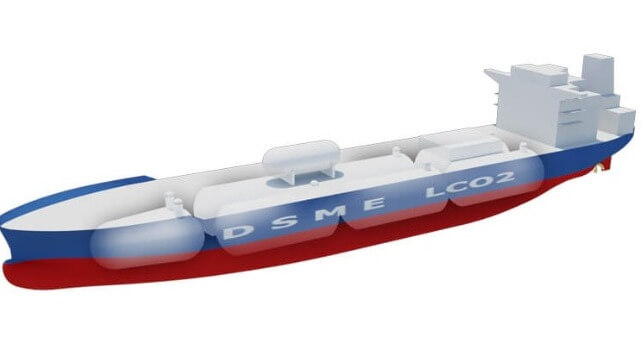Daewoo Receives Design Approval from ABS for Largest LCO2 Carrier

Daewoo Shipbuilding & Marine Engineering received design approval for the largest liquified CO2 carrier yet developed as part of the South Korean shipbuilder’s efforts to build a leadership role in the emerging sector. They reported that the design which received Approval in Principle from ABS and beyond its size also incorporates several new design elements.
DSME reports with the recent development of decarbonization policies and carbon capture technology around the world, interest in liquid carbon dioxide transportation aboard ships is increasing. In particular, they believe that the development of a super-large LCO2 carrier is required because the small LCO2 carriers with a capacity of 1,000 to 2,000 cubic meters currently used in the food industry will have limitations in satisfying the demands of the emerging carbon capture market.
For this reason, the super-large LCO2 carrier approved by ABS is receiving a lot of attention. DSME’s concept is for a vessel measuring 853 feet in length and with a beam of approximately 145 feet, making it the largest LCO2 carrier that so far has been certified by the classification society. The design provides for a capacity of 70,000 cubic meters for the first ultra-large liquefied carbon dioxide carrier.
In addition, the vessel was developed with a design that can respond to various future environmental regulations. Currently, they anticipate using an LNG propulsion engine and the design is also ready for carbon dioxide capture and storage. Space is provided for the installation of a CO2 capture device aboard the ship.

that matters most
Get the latest maritime news delivered to your inbox daily.
DSME reports that the cargo hold design and cargo management system in addition to the certification from ABS met the IMO's IGC Code for vessels carrying liquefied gases in bulk and complies with all current international regulations. The shipyard is also “developing new materials for the liquefied carbon dioxide storage tanks and developing a new ship design that can increase the owner's operating efficiency by increasing the tank's capacity.”
The shipyard looks to accelerate the development of new types of vessels to realize carbon-free goals. Using its accumulated technologies in the field of liquefied gas carriers such as LNG and LPG vessels, Daewoo Shipbuilding & Marine Engineering looks to dominate the market in the liquefied carbon dioxide carrier segment.
